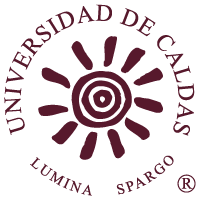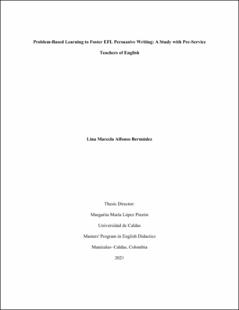Mostrar el registro sencillo del ítem
Problem-Based Learning to Foster Persuasive Writing: A Study with Pre-Service Teachers of English
| dc.contributor.advisor | López Pinzón, Margarita Maria | |
| dc.contributor.author | Alfonso Bermúdez, Lina Marcela | |
| dc.date.accessioned | 2021-08-24T14:44:06Z | |
| dc.date.available | 2021-08-24T14:44:06Z | |
| dc.date.issued | 2021-08-23 | |
| dc.identifier.uri | https://repositorio.ucaldas.edu.co/handle/ucaldas/17033 | |
| dc.description | Ilustraciones, graficas, fotografías | spa |
| dc.description.abstract | eng: This investigation explores Problem -Based Learning as a model to promote persuasive writing. The purpose was to analyze how pre-service English language teachers with an upper intermediate level could achieve an understanding of controversial topics, and proposed, in writing, contextualized and well-structured solutions. The data gathered to identify the problem suggest that there are areas for continued development in writing. During the diagnostic stage, it was identified that participants did well in summarizing, analyzing, and interpreting but required guidance and practice in taking a stand, and having their academic voices heard. The study adopted an action research methodology which implied the design of workshops to appraise its appropriateness and give an account of the processes and outcomes evidenced in participants’ written products. The pedagogical intervention consisted on the implementation of six workshops based on issues related to the participants’ context. Then, Problem-based learning was selected as the approach to enhance persuasive writing since it uses issues for the analysis, integration, and adaptation of new knowledge, and it provides different types of instruction that help students develop their communicative skills (Barrows, 1996). This action stage was evaluated through different instruments such as a teacher’s journal, a self-assessment form, and a persuasive writing rubric to measure some strategies. The main findings of this study displayed positive results in terms of students’ effective writing performance, effectiveness of the use of Problem-Based Learning, and participants’ positive perceptions towards writing. Additionally, learners acquired pre-writing and writing strategies that contributed to improve their writing performance. | eng |
| dc.description.abstract | spa: Esta investigación explora el Aprendizaje Basado en Problemas como un modelo para promover la escritura persuasiva. El propósito de este estudio es analizar la manera como profesores en formación con un nivel superior-intermedio de inglés pueden alcanzar un entendimiento de temas controversiales y proponer soluciones escritas, contextualizadas y bien estructuradas. La información obtenida para identificar el problema sugiere que existen áreas de desarrollo continuo en escritura. Durante la fase diagnóstica, se identificó que los participantes se desempeñaban bien resumiendo, analizando, e interpretando información, pero requerían orientación y práctica para tomar una posición y hacer que sus voces académicas fuesen escuchadas. El estudio adoptó la metodología de investigación acción, la cual implicaba diseñar talleres para evaluar su conveniencia y dar cuenta de los procesos y resultados evidenciados en los productos escritos de los participantes. La intervención pedagógica consistió en la implementación de seis talleres basados en problemas relacionados con el contexto de los participantes. Port al motivo, el Aprendizaje Basado en Problemas fue la metodología seleccionada para promover la escritura persuasiva debido a que se adoptan problemáticas para el análisis, integración, y adaptación de nuevo conocimiento, y provee diferentes tipos de instrucción que ayuda a los estudiantes a desarrollar sus habilidades de competencia comunicativa (Barrows, 1996). La fase de acción fue evaluada a través de diferentes instrumentos tales como un diario docente, un formato de autoevaluación, y una rúbrica de escritura persuasiva. Los hallazgos más importantes de este estudio demuestran resultados positivos en términos del desempeño efectivo en escritura, efectividad en la implementación del Aprendizaje Basado en Problemas, y en las percepciones positivas de los participantes en cuanto a la escritura. Adicionalmente, los aprendices adquirieron estrategias que contribuyeron a mejorar su desempeño escrito. | spa |
| dc.description.tableofcontents | Abstract/ Resumen/ Introduction/ Chapter I. Research Problem / 1.1 Purpose of the research / 1.2 Description of the Context and setting/ 1.3. Description of the Problem/ 1.4 Research Question and Objectives/ Chapter II. Literature Review / 2.1 Theoretical framework/ 2.1. 1. Problem-Based Learning / 2.1.2. Features of Problem-Based Learning/ 2.1.3. Problem-Based Learning and language instruction / 2.1.4. Teacher’s and students’ role in Problem-Based Learning / 2.2 Persuasive writing skills / 2.2.1. Persuasive writing skills and EFL learning / 2.2.2 The six traits of writing/ 2.3 Research on PBL and Language / Chapter III. Research Methodology/3.1 Type of study / 3.2 Participants/ 3.3 Instruments/Chapter IV. Phases of the Study / 4.1 Diagnostic stage / 4.1.2 Data triangulation in the diagnostic stage / 4.2 Instructional design/ 4.3 Action Stage / 4.3.1. Overview of the workshops/ 4.4 Evaluation stage / 4.4.1 Phase One/ 4.4.2 Phase two / 4.4.3 Phase three / 4.4.4 Triangulation of categories in the evaluation stage / Chapter V. Findings/Chapter VI. Conclusions, Pedagogical Implications, Limitations, and Questions for Further Research/ 6. 1. Conclusions/6.2 Limitations/6.3 Further research / References/ Appendixes / Appendix 1: Teacher's journal / Appendix 2: External observation / Appendix 3: Writing perceptions survey / Appendix 4: Workshops and worksheets /Appendix 5: Teacher's journal format / Appendix 6: Persuasive writing rubric /Appendix 7: Self-assessment form . | eng |
| dc.format.mimetype | application/pdf | spa |
| dc.language.iso | eng | spa |
| dc.language.iso | spa | spa |
| dc.title | Problem-Based Learning to Foster Persuasive Writing: A Study with Pre-Service Teachers of English | eng |
| dc.type | Trabajo de grado - Maestría | spa |
| dc.description.degreelevel | Maestría | spa |
| dc.identifier.instname | Universidad de Caldas | spa |
| dc.identifier.reponame | Repositorio institucional Universidad de Caldas | spa |
| dc.identifier.repourl | https://repositorio.ucaldas.edu.co/ | spa |
| dc.publisher.faculty | Facultad de Artes y Humanidades | spa |
| dc.publisher.place | Manizales | spa |
| dc.relation.references | Abdullah, D. (2020). The effect of SPAWN strategy in developing persuasive writing skills and productive habits of mind. Arab World English Journal (AWEJ)11(31), 459-481. | spa |
| dc.relation.references | AlKhairi, M. (2013). Saudi English-Major Academic Writing Problems: Taif University Perspective. English Language Teaching, 6(6), 1-12 | spa |
| dc.relation.references | Ansarian, L., Adlipour, A. A., Saber, M. A., & Shafiei, E. (2016). The impact of problem-based learning on Iranian EFL learners’ speaking proficiency. Advances in Language and Literary Studies, 7(3), 84-94. | spa |
| dc.relation.references | Barell, J. (2010). Problem-based learning: The foundation for 21st-century skills. 21st Century Skills: Rethinking How Students Learn, 175-199. | spa |
| dc.relation.references | Barrows, H. S. (1996). Problem‐based learning in medicine and beyond: A brief overview. New directions for teaching and learning, (68), 3-12. | spa |
| dc.relation.references | Barrows, H & Tamblyn, R. (1980). Problem-based learning: An approach to medical education. New York: Springer Publishing Company, Inc. | spa |
| dc.relation.references | Bashith, A., & Amin, S. (2017). The effect of problem-based learning on EFL students’ critical thinking skills and learning outcome. Al-Ta’lim Journal, 24(2), 93-102. | spa |
| dc.relation.references | Boud, D., & Feletti, G. (1997). The challenge of problem-based learning. London: Kogan | spa |
| dc.relation.references | Bruton, A. (2005). Process writing and communicative-Task-Based instruction: Many common features, but more common limitations. TESL-EJ Top, 9(3), 1- 31. | spa |
| dc.relation.references | Bueno, P., Rivas, S., & Saiz, C. (2015). Critical thinking assessment with PENCRISAL test in a hybrid approach to PBL. In E.de Graaff, A. Guerra, A. Kolmos & N. A. Arexolaleiba 54 (Eds.), Global Research Community: Collaboration and Developments (pp. 213-222). Denmark: Aalborg Universitetsforlag. | spa |
| dc.relation.references | Burns, A. (1999). Collaborative Action Research for English Language Teachers. United Kingdom: Cambridge University Press. | spa |
| dc.relation.references | Burns, M. (2004). Writing in math. Educational Leadership, 62(2), 30–33. | spa |
| dc.relation.references | Burns, A. (2010). Doing action research in English language teaching: A guide for practitioners. New York, NY: Routledge. | spa |
| dc.relation.references | Charmaz, K. (2006). Constructing Grounded Theory: A Practical Guide Through Qualitative Analysis. SAGE. | spa |
| dc.relation.references | Cheung, H. Y. (2006). The measurement of teacher efficacy: Hong Kong primary inservice teachers. Journal of Education for Teaching: International Research and Pedagogy, 32(4), 435-451. doi: 10.1080/02607470600982134 | spa |
| dc.relation.references | Coombe, C., & Brown, J. (2015). The Cambridge guide to research in language teaching and learning. Cambridge: Cambridge University Press | spa |
| dc.relation.references | Cornwell, S. (1999). Interview with Anne Burns and Graham Crookes. The Language Teacher, 23(12), 5-10. | spa |
| dc.relation.references | Creswell, J. W. (2002). Educational Research: Planning, Conducting, and Evaluating Quantitative and Qualitative Research: Pearson Education, Inc. | spa |
| dc.relation.references | Culham, R. (2005). Traits of writing: The complete guide for the primary grades. New York: Scholastic Inc. | spa |
| dc.relation.references | Culham, R. (2015). Traits of writing: The complete guide for middle school. New York: Scholastic Inc. | spa |
| dc.relation.references | Cummins, J. (2008). BICS and CALP: Empirical and theoretical status of the distinction. In B. Street & N. H. Hornberger (Eds.), Encyclopedia of language and education (2nd Edition), Volume 2: Literacy (pp. 71-83). New York: Springer Science + Business Media LLC | spa |
| dc.relation.references | Cunningham, J. (1993). Action research and organizational development. Westport, CT: Praeger | spa |
| dc.relation.references | Cunningham, J. (1993). Assessing the reliability of four job evaluation plans. Canadian Journal of Administrative Sciences, 10(1), 31-47. | spa |
| dc.relation.references | DeJarnette, N. (2008). Effect of the 6+1 Writing Model on Student Writing Achievement. (Doctoral Dissertation, Liberty University, USA). | spa |
| dc.relation.references | Foo, E. (2013). PBL and other inquiry-driven pedagogical approaches. Reflections on ProblemBased Learning, (14), 9-11. | spa |
| dc.relation.references | Freeman, D. (1998). Doing teacher research: from inquiry to understanding. New York: Heinle & Heinle. | spa |
| dc.relation.references | Gravetter, F., & Forzano, L.-A. (2012). Research methods for the behavioral sciences. (4th edition). Belmont, California, USA: Nelson Education. | spa |
| dc.relation.references | Halpern, D. F. (2014). Thought and knowledge: An introduction to critical thinking (5th ed.). New York: Psychology Press. | spa |
| dc.relation.references | Hattie, J., & Timperley, H. (2007). The power of feedback. Review of Educational Research, 77, 81-112 | spa |
| dc.relation.references | Herrera, S. L. (2002) Exploring the role of corrective feedback in second language writing. (Master's Thesis, University of British Columbia, Canada) | spa |
| dc.relation.references | Hung, W., Jonassen, D. H., & Liu, R. (2008). Problem-based learning. Handbook of Research on Educational Communications and Technology, (3)485-506 | spa |
| dc.relation.references | Isernhagen, K., & Kozisek, J. (2000). Improving students’ self-perceptions as writers. Journal of School Improvement, 1(2), 29 – 32. | spa |
| dc.relation.references | James, L., Abbott, M., & Greenwood, C. (2001). How Adam became a writer: Winning writings strategies for low-achieving students. Teaching Exceptional Children, 33(3), 30- 37. | spa |
| dc.relation.references | Javid C. & Umer M. (2014). Saudi EFL learners’ writing problems: A move towards solution. GSE Global Summit on Education Conference, 4–5. | spa |
| dc.relation.references | Jonassen, D., & Hung, W. (2008). All problems are not equal: Implications for problem-based learning. Interdisciplinary Journal of Problem-Based Learning, 2(2), 6-28. | spa |
| dc.relation.references | Kemmis, S., & McTaggart, R. 1(988). The Action Research Planner. Melbourne: Deakin University Press. | spa |
| dc.relation.references | Kemper, D., Sebranek, P., & Meyer, V. (2009). Write source: A book for writing, thinking, and learning. Wilmington, MA: Great Source Education Group. | spa |
| dc.relation.references | Korau, S., & Aliyu, M. (2020). Use of metadiscourse in the persuasive writing of Nigerian undergraduates. Canadian Center of Science and Education, 13(4), 104-113. | spa |
| dc.relation.references | Kristmanson, P. L., Dicks, J., & Le, J. (2009). Language writing model at elementary and middle school levels. WAP, 1(1), 37–62. | spa |
| dc.relation.references | Lin, Y.M. & Lee, P.C. (2013). The practice of business’s teacher teaching: a perspective from critical thinking. International Journal of Business and Commerce, 2(6), 52-58. | spa |
| dc.relation.references | Maarof, N., & Murat, M. (January 01, 2013). Writing Strategies Used by ESL Upper Secondary School Students. International Education Studies, 6(4), 47-55. | spa |
| dc.relation.references | Major, C. H., & Palmer, B. (2001). Assessing the effectiveness of problem-based learning in higher education: Lessons from the literature. Academic Exchange Quarterly, 5(1), 4-9. | spa |
| dc.relation.references | Major, C. H., & Palmer, B. (2001). Assessing the effectiveness of problem-based learning in higher education: Lessons from the literature. Academic Exchange Quarterly, 5(1). | spa |
| dc.relation.references | Mardziah, A. (2005). Problem-based learning in language instruction: a constructivist method. ERIC Clearing house on Reading, English, and Communication. | spa |
| dc.relation.references | Masek, A. & Yamin, S. (2011). The effect of problem-based learning on critical thinking ability: a theoretical and empirical review. International Review of Social Sciences and Humanities, 2(1), 215-221 | spa |
| dc.relation.references | Mathews, M. B. (1989). Essentials of problem-based learning. Medical Education, 23(6), 542 558. | spa |
| dc.relation.references | Medley, F. W., & Rogers, C. (1988). Language with a purpose: using authentic materials in the foreign language classroom. Foreign Language Annals, 21(5), 467-478. | spa |
| dc.relation.references | Moore, N. S. (2009). The effects of being a reader and of observing readers on fifth-grade students’ argumentative writing. (Doctoral Dissertation, University of Delaware, Newark) | spa |
| dc.relation.references | Muñoz, D. (2017). Problem-based learning: An experiential strategy for English language teacher education in Chile. PROFILE Issues in Teachers’ Professional Development, 19(1), 29-40. | spa |
| dc.relation.references | Ng, P. (2003). Effective writing: A guide for social science students. Hong Kong: The Chinese University of Hong Kong. | spa |
| dc.relation.references | Norman, G. R., & Schmidt, H. G. (1992). The psychological basis of Problem-Based Learning: A review of the evidence. Academic Medicine, 67(9), 557-565. | spa |
| dc.relation.references | Novero, R. (2015). Persuasive writing and English language learners in middle school. (Master's thesis, Saint Mary’s College of California, U.S) | spa |
| dc.relation.references | Nunan D. (2002). Reasearch methods in language learning. Cambridge university press. | spa |
| dc.relation.references | Núñez, A., & Téllez, M. (2009). ELT materials: the key to fostering effective teaching and learning settings. PROFILE Issues in Teachers’ Professional Development, 11(2), 171- 186. | spa |
| dc.relation.references | Núñez, A., Téllez, M., Castellanos, J.(2017b). Teacher–developed materials in a master’s programme in education with emphasis on english didactics. In A. Núñez, M. F. Téllez, & J. Castellanos (Eds.), The role of teacher-developed materials in fostering English language skills (pp. 13-56). Bogotá, Colombia. Departamento de Publicaciones Universidad Externado de Colombia. | spa |
| dc.relation.references | Nuñez-Pardo, A. (2018). The English textbook. Tensions from an intercultural perspective. GiST Education and Learning Research Journal, (17), 230-259. | spa |
| dc.relation.references | Nurhadi, Yasin, B. and Senduk, A.G. (2004). Pembelajaran Kontekstual dan Penerapannya dalam. KBK, Universitas Negeri Malang, Malang. | spa |
| dc.relation.references | Othman, N. & Ahamad, M. (2013). Problem-Based Learning in the English language classroom. In English Language Teaching. Canadian Center of Science and Education, 6(3), 125-134. | spa |
| dc.relation.references | Parsons, R., & Brown, K. (2002). Teacher as a reflective practitioner and action researcher. Belmont, California, USA: Wadsworth/Thomson Learning. | spa |
| dc.relation.references | Parsons, R., & Brown, K. (2002). Teacher as a reflective practitioner and action researcher. Belmont, California, USA: Wadsworth/Thomson Learning. | spa |
| dc.relation.references | Philippakos, MacArthur & Coker, D. L. (2015). Developing strategic writers through genre instruction: Resources for grades 3-5. New York: Guilford Press | spa |
| dc.relation.references | Sachar, C. (2013). The writer's workbook: A strategic intervention for persuasive and argumentative writing (doctoral dissertation, University of Delaware, Delaware, U.S) | spa |
| dc.relation.references | Sadler, D. R. (1989). Formative assessment and the design of instructional systems. Instructional Science, 18(2), 119-144. | spa |
| dc.relation.references | Sanford, N. (1970). Whatever happened to action research? Journal of Social Issues, 26(4), 3- 23. | spa |
| dc.relation.references | Shukri, N. A. (2014). Second language writing and culture: Issues and challenges from the Saudi learners' perspective. Arab World English Journal, 5(3), 190-207. | spa |
| dc.relation.references | Spandel, V., & Stiggins, R. (1990). Creating writers: Linking assessment and writing instruction. New York: Longman. | spa |
| dc.relation.references | Steineger, M. (1996). A way with words. Northwest Education, 2(1), 20- 24. | spa |
| dc.relation.references | Tan, O. (2003). Problem-based learning innovation. Singapore: Thomson. | spa |
| dc.relation.references | Watson, G. (2001). Problem-based learning. Speaking of Teaching, 11(1), 1-7 | spa |
| dc.relation.references | Watson, George. (2001). In Othman, M. I. A. Problem-based learning. Speaking of Teaching, 11(1), 1-7. | spa |
| dc.rights.accessrights | info:eu-repo/semantics/closedAccess | spa |
| dc.subject.lemb | Lenguas | |
| dc.subject.lemb | Enseñanza | |
| dc.subject.lemb | Estudio-Métodos | |
| dc.subject.proposal | Controversial topics | eng |
| dc.subject.proposal | High order thinking | eng |
| dc.subject.proposal | Persuasive writing | eng |
| dc.subject.proposal | Problem-Based Learning | eng |
| dc.type.coar | http://purl.org/coar/resource_type/c_bdcc | spa |
| dc.type.content | Text | spa |
| dc.type.driver | info:eu-repo/semantics/masterThesis | spa |
| dc.type.redcol | https://purl.org/redcol/resource_type/TM | spa |
| dc.type.version | info:eu-repo/semantics/publishedVersion | spa |
| oaire.version | http://purl.org/coar/version/c_ab4af688f83e57aa | spa |
| oaire.accessrights | http://purl.org/coar/access_right/c_14cb | spa |
| dc.description.degreename | Magister en Didáctica del Inglés - Manizales | spa |
| dc.publisher.program | Maestría en Didáctica del Inglés - Manizales | spa |
| dc.description.researchgroup | Metodologías y estrategias para el aprendizaje del inglés | spa |







